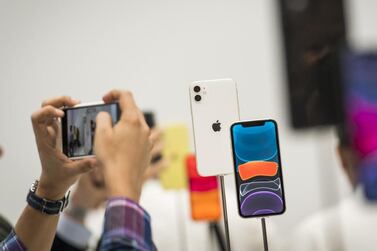If the past decade was all about the smartphone, the next will be defined by the deluge of devices and data points connected to 5G, from our cars and tablets to security cameras at airports and online medical records.
Broad adoption of the fifth-generation wireless network, known as 5G, is unlikely to take hold until at least 2025. Governments and the private sector are likely to take advantage of 5G before individual consumers, analysts say.
For consumers, the higher price of 5G-enabled smartphones is a major hurdle, leaving the experience to the early adopters, rather than becoming a mainstream global phenomenon. Most such smartphones are at the high end of the market, costing Dh5,000 or more.
But as we experienced with the uptake of 3G and 4G, improved download speeds will give rise to new innovations and products.
While the addictive game Angry Birds, social networking giant Facebook and ride-hailing app Uber shaped the past decade, developers are already at work coming up with the next big idea – and it is unlikely to be developed specifically for a smartphone.
The next-generation network will be 100 times faster than what we are used to, getting as close to ‘real time’ speed as humanity can be. The increased efficiency will lead to cost savings, an incentive for the private sector to invest in developing products that rely on the network, known as the Internet of Things. Between 2018 and 2030, the value in the number of IoT-connected devices is forecast to more than double, from $22 billion to $50bn.
The vast improvement of voice recognition and facial recognition, the new experiences possible in virtual and augmented reality environments and the potential for autonomous driving and automated systems mean we won’t live by the smartphone alone.

Already, voice assistants are better at conversing and are doing so in more languages (Google rolled out its Arabic assistant earlier this month) and robots and drones have improved precision – all boosted by lower latency in network connections.
But even though 5G networks have been switched on in the UAE (first at Jumeirah Lakes Towers in Dubai) and throughout the GCC, as well as in parts of Europe, North America and Asia, the new network will be used first by large sector players in security, aviation and energy, said Simone Vernacchia, a partner specialising in digital and cyber security at PwC Middle East.
But he predicts that over the next decade, human-machine interactions will increase as more and more devices begin gathering data through sensors and cameras, and the movement of the human body "will create new kinds of interfaces" for products, he told The National.
The warning for any user of 5G, Mr Vernacchia said, is being aware of security risks. The speed of the new network is achieved in part by doing away with an internal gateway that was previously needed to go online.
With 5G, a device is connected directly with no intermediary, which was typically used to layer on security. No such security gateway will exist with the new network, and as use cases for 5G are being developed, so too are security fixes to lessen vulnerability to hacks.
“Every single device is connected to a public network,” Mr Vernacchia said.
“This advantage of saving money [using 5G] is creating monsters.”
Buyer beware.







